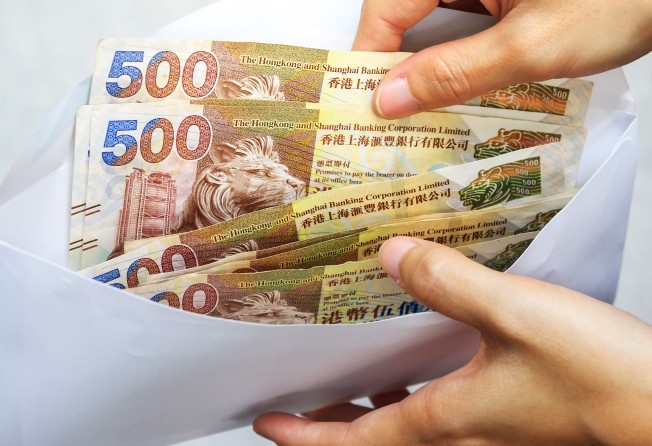Finance chief Paul Chan dishes out budget sweeteners worth billions to Hong Kong taxpayers
Despite widespread calls for some of the bumper HK$138 billion surplus to be ploughed back to the public in cash handouts, only needy students will get a grant

Rebates, allowances, rate waivers and free cash for pupils – Hong Kong taxpayers will benefit from more than HK$50 billion in sweeteners and tax concessions this year as the city’s bulging fiscal surplus balloons to a record HK$138 billion (US$17.6 billion).
But despite widespread calls for some of the riches to be ploughed back to the public in cash, Financial Secretary Paul Chan Mo-po put to rest all talk of handouts to residents – with the exception of needy students, who will get a one-off HK$2,000 grant to support their learning.
The details were unveiled by Chan in his one hour, 50 minute budget speech on Wednesday, in which he pledged to reduce tax burdens on individuals. He announced that bands for salaries tax would be widened from the current HK$45,000 to HK$50,000, and the number of bands raised from four to five.
The marginal rates for these bands will be adjusted to 2 per cent, 6 per cent, 10 per cent, 14 per cent and 17 per cent respectively.
“These measures will reduce the tax burden of 1.34 million taxpayers and reduce tax revenue by HK$4.09 billion a year,” Chan said.
Married couples will also have the option to decide whether to elect for personal tax assessment, Chan added.
For individual salary earners, a 75 per cent reduction in salaries tax and tax under personal assessment for 2017-18 – subject to a ceiling of HK$30,000 – is in store, benefiting 1.8 million taxpayers.
Taxes on profits will also be slashed by 75 per cent subject to a ceiling of HK$30,000, up from last year’s HK$20,000 and benefiting 142,000 taxpayers and reducing tax revenues by HK$2.9 billion.
For property owners, rates will be waived for all four quarters of the 2018-19 financial year, subject to a HK$2,500 cap per quarter per rateable property, more than double that of last year’s waiver. The sweeteners will be enjoyed by owners of some 3.25 million properties across the city.
Last year, Chan also waived rates for four quarters of 2017-18, but the ceiling was much lower, at HK$1,000 per quarter for each rateable property.

More than 600,000 taxpayers will also enjoy higher allowances for dependent parents and grandparents. Childcare allowances for 335,000 taxpayers will also be raised from HK$100,000 to HK$120,000.
Those burdened with hefty elderly residential care expenses will see allowances raised from the current HK$92,000 to HK$100,000, while a new personal disability allowance of HK$75,000 has been introduced for eligible taxpayers.
Chan also proposed a tax deduction with a ceiling of HK$8,000 per insured person for those who join the government’s Voluntary Health Insurance Scheme.
For many of the middle-class families, tax breaks are seen as one of the most effective measures to lighten their burden.
Ivy Tang Chi-lai and her husband are both working professionals and earn a combined household income of HK$180,000 every month. They support four young children and three elderly parents.
Tang said she was “satisfied” with the budget this year, especially as they were able to benefit from a generous tax rebate, property rate waiver and an increase in allowances for children and dependent elderly parents.

“On paper, it might seem like we earn a lot, but when you have so many mouths to feed, the expenses add up to quite a lot every month,” said Tang, who works as a vice principal at a secondary school.
From paying the mortgage, elderly medical bills, school fees and the children’s extracurricular activities, Tang said each month they spend around 80 per cent of their monthly income on a long list of expenses.
Tang’s family would be able to save an estimated HK$47,420 under the new tax model including property rates waived for all four quarters, according to a calculation by the accounting firm PwC.
The family is expected to pay HK$163,420 in taxes for the financial year ending in March. But under the new tax model, they would only have to pay about HK$126,000.
This is due to an increase in child and dependent parent allowances, a tax rebate of HK$30,000 per person, and an additional tax band.

During his speech, Chan revealed a record HK$138 billion fiscal surplus and pledged to share nearly 40 per cent of it with the public, while investing the rest on the future and on improving public services.
Chan pledged to provide extra allowances for social security recipients, equal to two months of the standard rate comprehensive social security assistance payments, old-age allowances and disability allowance, totalling to added expenditures of HK$7 billion.
Similar arrangements will apply to recipients of the low-income Working Family Allowance and Work Incentive Transport Subsidy, involving an additional expenditure of about HK$379 million.
Commenting after Chan finished his address, Chief Executive Carrie Lam Cheng Yuet-ngor said: “While ensuring the health of our public finance, the financial secretary has adopted forward-looking and strategic financial management principles in optimising the use of surplus to invest for Hong Kong and relieve our people’s burdens.”